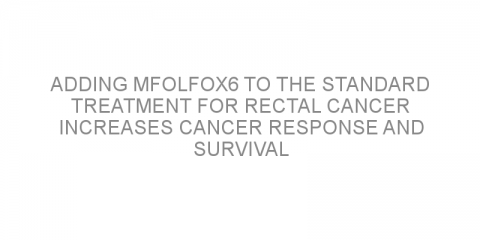In a nutshell This study examined how effective additional chemotherapy alongside chemo-radiotherapy is in patients with locally advanced non-small cell lung cancer. The study found that additional chemotherapy did not bring survival benefits in these patients. Some background Non-small cell lung cancer (NSCLC) can be difficult to treat. There are a...
Read MoreOngoing treatment(s)-Radiation Posts on Medivizor
MRI prognostic parameters in tailoring treatment for locally advanced rectal cancer
In a nutshell This study investigated the use of MRI predictive results to decide the best treatment for patients with locally advanced rectal cancer (LARC). Researchers suggested that early MRI results should be used in the treatment decision making. Some background Colorectal cancer is the third most common cancer in the world. Patients with LARC...
Read MoreLooking for patients with lung cancer to test a new immunotherapy combination
In a nutshell This phase 1/2 trial is examining the effectiveness of durvalumab (Imfinzi) and monalizumab to treat patients with solid tumors, including lung cancer. The main outcomes to be measured are tumor response to the treatment and side effects. The details Cancer is one of the leading causes of death worldwide. Chemotherapy is only of limited...
Read MoreTime to lowest PSA level and the risk of death from prostate cancer
In a nutshell This study aimed to investigate the link between PSA (prostate-specific antigen) levels and prostate cancer (PCa) prognosis. This study found that a lower PSA level (less than 0.2ng/ml) was associated with less risk of dying from PCa. Some background The PSA is a substance produced by the prostate. It can be used as a marker during...
Read MoreCan durvalumab increase survival in patients with stage III lung cancer?
In a nutshell This article investigated the safety and effectiveness of durvalumab (Imfinzi) for the treatment of unresectable non-small-cell lung cancer (NSCLC). The authors concluded that durvalumab is safe and can improve survival of these patients. Some background Non-small cell lung cancer (NSCLC) is the most common kind of lung cancer....
Read MoreAdding mFOLFOX6 to the standard treatment for rectal cancer increases cancer response and survival
In a nutshell This study investigated whether adding mFOLFOX6 (modified; folinic acid, fluorouracil, and oxaliplatin) chemotherapy after standard chemotherapy and radiotherapy (CRT) and delaying surgery improves cancer response and survival in rectal cancer. Researchers suggest that this treatment increases disease-free survival (DFS;...
Read MoreIs there a link between radiation therapy and future heart problems in patients with small-cell lung cancer?
In a nutshell This study looked at the link between cardiac (heart) events in the years after radiation therapy in patients with small-cell lung cancer. The authors concluded that there is a long-term risk of cardiac events in patients treated with a combination of radiation therapy and chemotherapy. Some background There have been several reports...
Read MoreComparing daily versus weekly imaging checks in radiation therapy for prostate cancer
In a nutshell This study aimed to investigate the best timing of treatment verification imaging used in radiation therapy for patients with prostate cancer. This study found that patients undergoing daily imaging had less risk of their cancer returning and had reduced rectal side-effects. Some background One main treatment option for prostate cancer...
Read MoreRisk of secondary cancers in patients who have been treated for early stage breast cancer
In a nutshell This study aimed to examine the risk of developing a secondary cancer after breast conserving therapy for early stage breast cancer patients. This study found that patients who have been treated for early stage breast cancer do not have a significantly higher risk of secondary cancers. Some background Women with early stage breast...
Read MoreRisk factors linked to pleural effusion after thoracic radiation
In a nutshell This study examined the incidence of pleural effusion in lung cancer patients after treatment with thoracic radiation therapy and identified risk factors associated with it. They concluded that patients treated with 5 Gy of radiation to over 41.5% of the lung were at the greatest risk of developing pleural effusion after treatment. Some...
Read MoreComparing conditioning regimens for transplant in acute myeloid leukemia patients
In a nutshell This study aimed to compare the effectiveness of myeloablative conditioning and reduced intensity conditioning before hematopoietic stem cell transplant in acute myeloid leukemia patients. This study concluded that myeloablative conditioning was more effective than reduced intensity conditioning. Some background A...
Read MoreComparing whole-breast radiotherapy and partial-breast radiotherapy for breast cancer patients who have undergone breast conservation surgery
In a nutshell This study aimed to compare the outcomes for patients who received whole and partial breast radiotherapy after undergoing breast conservation surgery. This study concluded that partial breast radiotherapy and lower dose radiotherapy had similar outcomes for patients when compared to whole breast radiotherapy. Some background...
Read More












